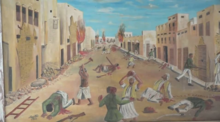| Battle of Ash-Shihr | |||||||
|---|---|---|---|---|---|---|---|
 Purple: Portuguese presence in Yemen, 16th and 17th century. Pink: Allied sultan territories | |||||||
| |||||||
| Belligerents | |||||||
|
|
| ||||||
| Commanders and leaders | |||||||
|
| |||||||
| Strength | |||||||
|
8 ships. 6 galleons. 400-700 soldiers | Unknown | ||||||
| Casualties and losses | |||||||
| Unknown | 480+ killed | ||||||
| Portuguese battles in the Indian Ocean | |
|---|---|
| |
| Portuguese colonial campaigns |

The Battle of Ash-Shihr was an attack launched by the Portuguese navy in 1523 on the city of Ash-Shihr which was a part of the Kathiri Sultanate.
In Thursday, February 28, 1523 (10 of the month of Rabi’ al-Awwal in the year 929 AH), the Portuguese governor of India, Dom Duarte de Meneses, dispatched his brother, Dom Luís de Meneses, to the Red Sea with a force of 6 galleons. Dom Luís was tasked with delivering an ambassador to the Christian Emperor of Ethiopia and hunting hostile Muslim trade ships sailing between the Indian Ocean and Jeddah. Along the way, he called at the city of Ash-Shihr.
After claiming that the property of a Portuguese merchant who had died in al-Shiḥr had been unlawfully seized by the Kathīrī sultan, Dom Luís ordered the assault of the city. It was then successfully attacked and sacked while the inhabitants fled. Shihr was further plundered by the settlement's garrison, and by vagrants. The city's defenders attempted to face them on the beaches, but they were routed and the emir Mutran b. Mansur was killed in battle with a bullet. The battle continued for three days between the people of the city of Al-Shihr and the Portuguese forces.
Seven of Ash-Shihr's legal scholars and learned men were killed by the Portuguese. These men would collectively come to be a known as “The Seven Martyrs of al-Shiḥr” and whose tomb would become the site of an annual pilgrimage.
See also
References
- "When Melodies Gather: The Mahra, the Āl Kathīr, and the Portuguese (1495 CE - 1548 CE)". When Melodies Gather: Oral Art of the Mahra. Standford University Press. Retrieved 2024-08-17.
- ^ Saturnino Monteiro: Batalhas e Combates da Marinha Portuguesa Volume II, 1522-1538, 1991, Livraria Sá da Costa Editora, p.25.
- ^ R. B. Serjeant: The Portuguese Off the South Arabian Coast. Hadrami Chronicles, 1974, Oxford University Press, pp. 171-172.
- Saturnino Monteiro: Batalhas e Combates da Marinha Portuguesa Volume II, 1522-1538, 1991, Livraria Sá da Costa Editora
- Luiz, Francisco de San (1875). Obras completas do Cardeal Saraiva d. Francisco de S. Luiz Patriarcha de Lisboa: Precedidas de uma introducção pelo Marquez de Rezende. Publicadas por Antonio Correia Caldeira (in Brazilian Portuguese). National Press.
- "When Melodies Gather: The Mahra, the Āl Kathīr, and the Portuguese (1495 CE - 1548 CE)". When Melodies Gather: Oral Art of the Mahra. Standford University Press. Retrieved 2024-08-17.
- ^ João de Barros: Da Ásia, III, II, Regia Officina Typpographica, 1779 edition, pp. 206-209.
- "When Melodies Gather: The Mahra, the Āl Kathīr, and the Portuguese (1495 CE - 1548 CE)". When Melodies Gather: Oral Art of the Mahra. Standford University Press. Retrieved 2024-08-17.